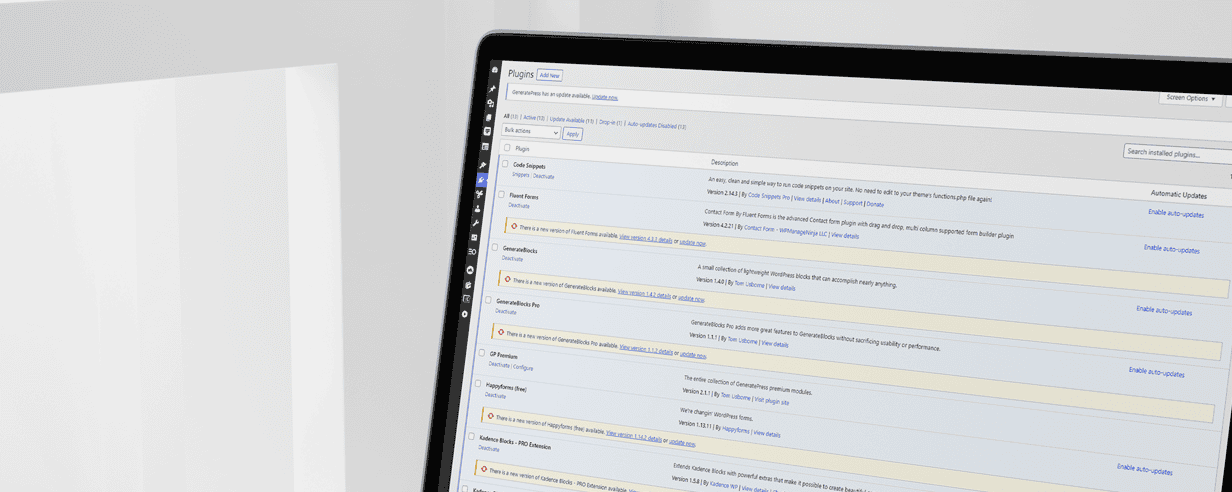Getting your business online has never been more crucial— or easier. Not many businesses are deciding whether or not they should have a website, instead they are considering how they should have a website built.
Do-it-yourself (DIY) solutions (like Wix and Squarepace) have made it easy to have pre-made, plug-and-play templates you can customize to get your business online in an afternoon.
But, like with anything in life, there are positives and negatives to these solutions.
While I do build custom websites for my customers, I refer people to templates and DIY solutions in many scenarios and understand they play a vital role in the marketplace.
Throughout this article I’m going to help you understand the factors you should consider, and if website templates are the right solution for your business’ needs.
Cost of Website Templates and DIY Solutions
Generally speaking, if cost is one of your most important factors, DIY builders and pre-made templates are going to be the cheapest route you can go.
Wix’s plans start at as little as $13 per month, with no upfront costs or setup fees. Given that the average lifespan of a website is around 3 years, your total investment can be as low as $500 (plus the cost of a domain).
As far as price goes, website templates are a very cost-effective option.
Website Ownership
When you setup a website with a DIY builder that uses a website template, you are effectively “renting” a website more than owning one.
These proprietary platforms only build websites that work within their ecosystem. If you decide one day that you are unhappy with their service, they all of a sudden change their pricing, or you find a better offer elsewhere, you cannot take your website with you.
This means you’d have to start from scratch again.
Consider if it’s more important to you to own or rent your website. If you don’t mind someone else owning your website while you use it, or if your website is just temporary, then a template-based website can be a good fit.
Flexibility and Control
There are thousands upon thousands of website templates on the market, many that are both gorgeous and free! Big companies like Wix & Squarespace employ talented designers that built out their templates.
Chances are you won’t have a problem finding a website template that matches the aesthetic you’re after.
The only drawback to the template approach in terms of flexibility is that you are “stuck” with only what the template provides. If your website requires a functionality or page that isn’t included in that template you might find it difficult to create something from scratch that matches your template’s look and feel.
Before selecting a template, think about all of the content & functionality you need today, and what you might want to add in the future. Trying to “bolt on” too many of your own pieces (that don’t quite match) can give the website a disjointed look.
Speed of Development
Anything that comes “pre-made” is going to cut out a lot of the time required to get it off the ground. With all of the styling options already done for you, all you will need to do is customize the content to suit your business needs.
Most website template providers will give you the option to test how their platform works– and you’d be wise to give them all a spin.
Even though the editing features are built for non-technical people, you’re still going to find a learning curve to get used to how the tools work. Most people will experiment with several iterations of their website (sometimes starting over completely) before they find their groove and produce results they are happy with.
Even though you could have a website built in an afternoon doesn’t mean that’s likely to happen. Be sure to schedule in some time to get familiar with the platform you choose.
What about Marketing?
One of the aspects that businesses often overlook is the “marketing” side of their website.
Sure, a template looks beautiful, but what results (besides vanity) do you want to see from your website?
More important than looks, your website needs to attract new prospects and turn them into loyal customers.
As an example, search engine optimization (also known as “SEO” or the processes to help your website come up in Google search results) can’t be done in a template. You’ll need to have a SEO strategy, and a thorough understanding of how search engines work if you want people to find your website through search.
Most templates will provide you with some basic SEO tools, but those things can’t be done-for-you. You’ll need to understand how to use those tools to optimize your website.
Similar things can be said for user experience, conversion rate optimization, and even copywriting.
Website Performance
Whether you realize it or not, how fast your website loads will have a lot to do with its ultimate success.
Studies have found that a website that takes more than 3 seconds to load starts losing visitors quickly. Google (and other search engines) realize this, so they give priority in their search results to websites that load quickly and perform well for users.
It’s almost impossible to know if the website template you’ve picked out is built for performance (even though nearly all of them will boast that they are).
One test could be to run the template through GTMetrix and see what kind of scores it produces. Just like school, an “A” is great, and an “F” is not something you want to see.
This test isn’t fool-proof, however. Keep in mind the template is only the starting point. What you do to customize the website will also affect its performance… so make sure you are doing things like optimizing your images and using the right file types when placing your content.
Conclusion
Website templates are a quick and cost-effective way to get your business online. With careful consideration and knowing what to look for, you can be successful with a DIY solution.
Take time to consider both the pros and cons before making your choice, as the lack of ownership, search engine optimization, and overall performance could make investing your time in a template a waste.
After reading this article and understanding a little bit more about website templates, perhaps you’re wondering what your alternatives are?
Professional website developers could help eliminate the drawbacks inherent with templates, but overcoming those issues comes at a cost.
According to a study in 2020 by WebFX, the average custom developed website ranges from $2,000 to $7,000. If you’d like to know more about hiring a web developer, you can read our article on choosing the right web developer for your needs, or have a look through our website buyer’s guide both of which will give you more information on going the custom development route.




